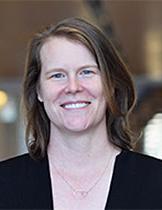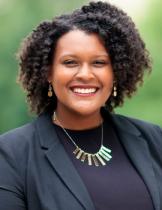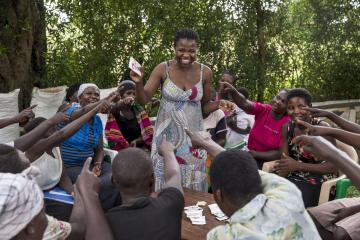
Addressing inequalities in women’s work: J-PAL launches Gender and Economic Agency Initiative

As COVID-19 triggers unprecedented economic disruptions, women are bearing the brunt of the hardship.
Women face even greater challenges to labor force participation than usual due to the pandemic. Thanks to generous support from the Bill & Melinda Gates Foundation, J-PAL’s new Gender and Economic Agency Initiative (GEA) launches to support innovative research on strategies to promote women’s work and enhance women’s economic agency.
Women’s jobs are at risk: 527 million employed women globally work in sectors hit hardest by the pandemic like food service, retail, and entertainment. Informal workers—58 percent of employed women—are particularly vulnerable, as they often faced low wages, poor conditions, and limited protections before the pandemic.
With closure of schools and daycares, women are also burdened with additional unpaid care and domestic responsibilities. This hinders their ability to engage in the labor force. Already before the pandemic, women performed three times more unpaid work than men.
GEA’s work is even more critical as the COVID-19 pandemic has worsened the already-marginalized position that women often face in the labor force. Women around the world participate in the labor force at much lower rates than men: 47 percent of women are in the labor force compared to 74 percent of men. If a woman enters the labor force, she earns on average 77 cents to every dollar a man earns. She’s also more likely to be unemployed or work in the informal sector.
Responses to this crisis must consider its disproportionate impact on women and the unique barriers they face. Rigorous evidence can help policymakers ensure that pandemic response and recovery support women’s work and economic agency.
Launching the Gender and Economic Agency Initiative
Increasing women’s labor force participation is key to achieving the Sustainable Development Goals (SDG5 and 8), however, policymakers and the private sector lack evidence on what works, where, and why. Consequently, women continue to suffer inequalities in the labor market that hinder their economic agency. GEA helps to address this gap through rigorous research.
Led by Lori Beaman (Northwestern) and Seema Jayachandran (Northwestern; Chair, J-PAL Gender Sector), GEA is funding randomized evaluations on women’s work and economic agency in East Africa and South Asia over the next three years. This policy-relevant research can help inform policies and programs on women’s labor force participation in GEA’s five priority countries: Ethiopia, Kenya, India, Uganda, and Tanzania.
Drawing upon our literature review on women’s agency, we’ve identified three themes for potential research:
- Creating work opportunities that are attractive to and supportive of women;
- Preparing women with the necessary skills to secure work and advance in their careers, including in self-employment; and
- Addressing restrictive gender norms and attitudes related to women’s work.
To learn more about potential topics of interest to GEA, please refer to our overview paper.
Research is only one part of GEA’s approach to supporting evidence-informed policies in East Africa and South Asia. We are also synthesizing evidence to share with policymakers and inform their strategies on women’s work and economic agency, building on the findings of a recent literature review on ways to increase women’s agency. Recognizing a growing need, we’re also working to identify and test better measurements of women’s agency that can be used in future research.
Each of GEA’s five priority countries has unique policy opportunities and challenges related to women’s work. For instance, a higher percentage of women work in the East African countries (64-79 percent) than in India (23 percent), suggesting women face different constraints to employment. For more information on the policy landscape in each country, please refer to the appendix of the overview paper.
In addition to the five priority countries, there is limited additional funding available for research in other countries in East Africa and South Asia.
Evaluating potential responses to the COVID-19 crisis
To better understand the impact of the pandemic on women’s economic agency and identify effective responses, GEA launched a special round of funding on COVID-19.
Women and men may experience job loss and recovery differently due to the types of occupations in which they work. Jobs primarily held by women, like healthcare or teaching, may also create additional health risks. Finally, women’s care responsibilities may hinder their ability to search for a job and work. Building upon ongoing studies, researchers are testing whether a job search assistance platform in Pakistan is especially valuable in helping women quickly return to the job search and employment.
Another study is looking at encouraging paid sick leave among female garment workers in Bangladesh. During a pandemic, paid sick leave is more important than ever to help prevent the spread of the virus. It may be especially vital to retain women in the labor force as they are generally responsible for taking care of sick family members. Yet, employees often fear backlash for taking leave. Researchers are partnering with a manufacturing firm to send text messages to workers stating its commitment to employees’ health and the use of sick leave when needed. The evaluation will examine the impacts of the messages on workers’ health and job satisfaction.
What’s next?
Through strong partnerships with researchers and policymakers, GEA aims to build inclusive work opportunities for women in East Africa and South Asia. Stay tuned over the next few months as we share publications and host events on our future work!
If you’re interested in partnering with us to shape policies on women’s work, please contact Mikaela Rabb.




